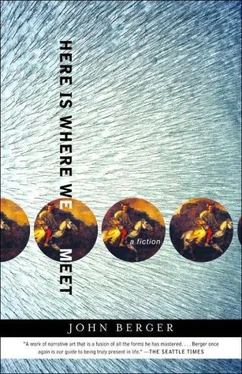A beam from a spotlight tracked across the boards; the voice, for some reason, stopped in mid-song, and it was at that moment that we saw a bird fly in through the open door, way below.
For several minutes it circled the dark space. Then it perched, confused, on a cable. We saw it was a starling. It headed towards the lights, believing they were exits into the sunshine. It had forgotten or could not refind the doorway it had come in by.
It flew between the hanging backdrops of Sea, Mountain, Spanish Inn, German Forest, Royal Palace, Peasant Wedding. And as it flew it cried Tcheeer! Tcheeer! more and more shrilly as it realised more and more surely that it was trapped.
Trapped birds need everything to go dark except their path of escape. This didn’t happen and so the starling hurtled against walls, curtains and canvas. Tcheeer! Tcheeer! Tcheeer!
There is an old opera-house superstition that if a bird is killed on stage, the building will catch fire.
The rehearsing soprano, in trousers and a T-shirt, came on stage. Perhaps someone had told her about the bird.
Tcheeer! Tcheeer! imitated Katya. The singer looked up and cottoned on. She too imitated the starling’s cry. The bird responded. The singer improved her pitch and the two cries became almost indistinguishable. The bird flew towards her.
Katya and I hurried down the metal stairs. As we passed the stagehands the young one said to Katya: Didn’t know you were a diva!
Outside in the street, at the corner of the theatre where the little door opened, the soprano, hands clasped before her, repeatedly sang: Tcheeer! Tcheeer! The elderly people with their ice creams and apricots were gathered around her, unsurprised. In such heat, in a deserted city, anything can happen.
Let’s have an espresso first, Katya said, then go to the cemetery.
She found a place fully in the sun. I sat in the shade. We heard clapping in the distance. Perhaps the bird had flown out. Who would believe us, she said, if we told the story?
The cemetery had wide lawns and tall trees. A thrush was stepping fastidiously over some newly mown grass. We asked a gardener, who was Bosnian, for directions.
We found the grave at last in a far corner. A simple headstone, and a rectangle of gravel on which was placed a wickerwork basket containing earth and a thick, small-leafed, very dark green shrub with berries. I must find out its name, for Borges loved exactitude; it gave him the possibility, when writing, of landing precisely where he chose. All his life he was scandalously or grievously lost in politics, but never on the page he was writing on.
Debo justificar lo que me hiere.
No importa mi ventura o mi desventura.
Soy el poeta.
I have to justify what wounds me.
My fortune or misfortune does not matter.
I am the poet.
The shrub, according to the Bosnian gardener, was Buxus sempervivens. I should have recognised it. In the villages of the Haute-Savoie one dips a sprig of this plant into holy water to sprinkle blessings for the last time on the corpse of the loved one laid out on the bed. It became a holy plant because of a shortage. On Palm Sunday there were never enough willow leaves available in the region, and so the Savoyards started to use the evergreen box instead.
He died, the gravestone announced, on June 14th 1986.
The two of us stood there in silence. Katya had a handbag hanging over her shoulder and I was holding my black crash helmet into which I had stuffed my gloves. We bent down to crouch over the gravestone.
On it was a low-relief carving of men in what looked like a medieval boat. Or were they on land and was it their warrior discipline that made them stand so close and steadfastly together? They looked ancient. On the back of the gravestone were other warriors, holding either lances or oars, confident, ready to cross whatever terrain or water had to be crossed.
When Borges came to Genève to die, he was accompanied by María Kodama. In the early sixties she had been one of his students studying Anglo-Saxon and Norse literature. She was half his age. When they got married, eight weeks before he died, they moved out of a hotel in an archive street called the Rue de la Tour-Maîtresse, into an apartment she had found.
This book, he wrote in a dedication, is yours, María Kodama. Must I say to you that this inscription includes twilights, the deer of Nara, night that is alone and populated mornings, shared islands, seas, deserts, and gardens, what forgetting loses and memory transforms, the high-pitched voice of the muezzin, the death of Hawkwood, some books and engravings?. . We can only give what we have given. We can only give what is already the other’s!
A young man with his son in a pushchair walked past while Katya and I were trying to decide what language the engraved inscription was in. The little boy pointed at a pigeon who strutted forward, and bubbled over with laughter, sure that it was he who had made the bird move.
The four words on the front of the stela were, we discovered, in Anglo-Saxon. And Ne Forhtedan Na. Should Not Be Afraid.
A couple approached an empty bench further down the cemetery path. They hesitated and then decided to sit. The woman sat on her man’s knees, facing him.
The words on the back were in Norse. Hann tekr sverthit Gram ok leggr i methal theira bert. He takes the sword Gram and lays it naked between them. The sentence comes from a Norse saga that Kodama and Borges loved over the years and played games with.
At the very bottom of the stela, near the grass, is written: From Ulrike to Javier Otárola. Ulrike was the name Borges lent Kodama, and Javier the name she lent him.
It’s a shame, I thought to myself, that we didn’t bring any flowers to leave. Then I had an idea: instead of flowers, I would leave one of my leather gloves.
The gardener driving his lawnmower was getting closer. I could hear the two-stroke engine and smell the newly cut grass. I know of no other smell which has as much to do with beginnings: morning, childhood, spring.
The memory of a morning.
Lines of Virgil and Frost.
The voice of Macedonio Fernándéz.
The love or the conversation of a few people.
Certainly they are talismans, but useless against
the dark I cannot name,
the dark I must not name.
I began to wonder. The glove will only look as if somebody has dropped it! A crumpled black dropped glove! It will mean nothing. Forget it. Better come back another day with a bouquet of flowers. What flowers?
O endless rose, intimate, without limit,
Which the Lord will finally show to my dead eyes.
Katya looked at me enquiringly. I nodded. It was time to go. We walked slowly back towards the gate, neither of us speaking.
You found the one you were looking for? asked the Bosnian gardener.
Thanks to you, replied Katya.
Family?
Yes family, she said.
Outside the theatre everything was calm and the door of the starling’s flight was closed. I had parked my bike next to Katya’s scooter. She went to fetch her helmet. About to put on my own, I pulled out the gloves. There was only one. I looked again. Only one.
What’s the matter?
There’s a glove missing.
You must have dropped it, we’ll go back, it’ll only take a minute.
I told her what had gone through my head as we were standing by the grave.
You underestimated him, she said conspiratorially, gravely underestimated him.
While we were laughing, I stuffed the remaining glove into my pocket and she climbed up behind me. Most of the lights were green and we were soon over the Rhône, leaving the city behind and taking the chicane bends up to the pass. The warm air rushed over my bare hands and Katya leant into the turns. I remembered how she had recently quoted Zeno of Elea in an SMS message to me: What is in motion is neither in the space where it is, nor in the space where it isn’t; for me this is a definition of music.
Читать дальше












